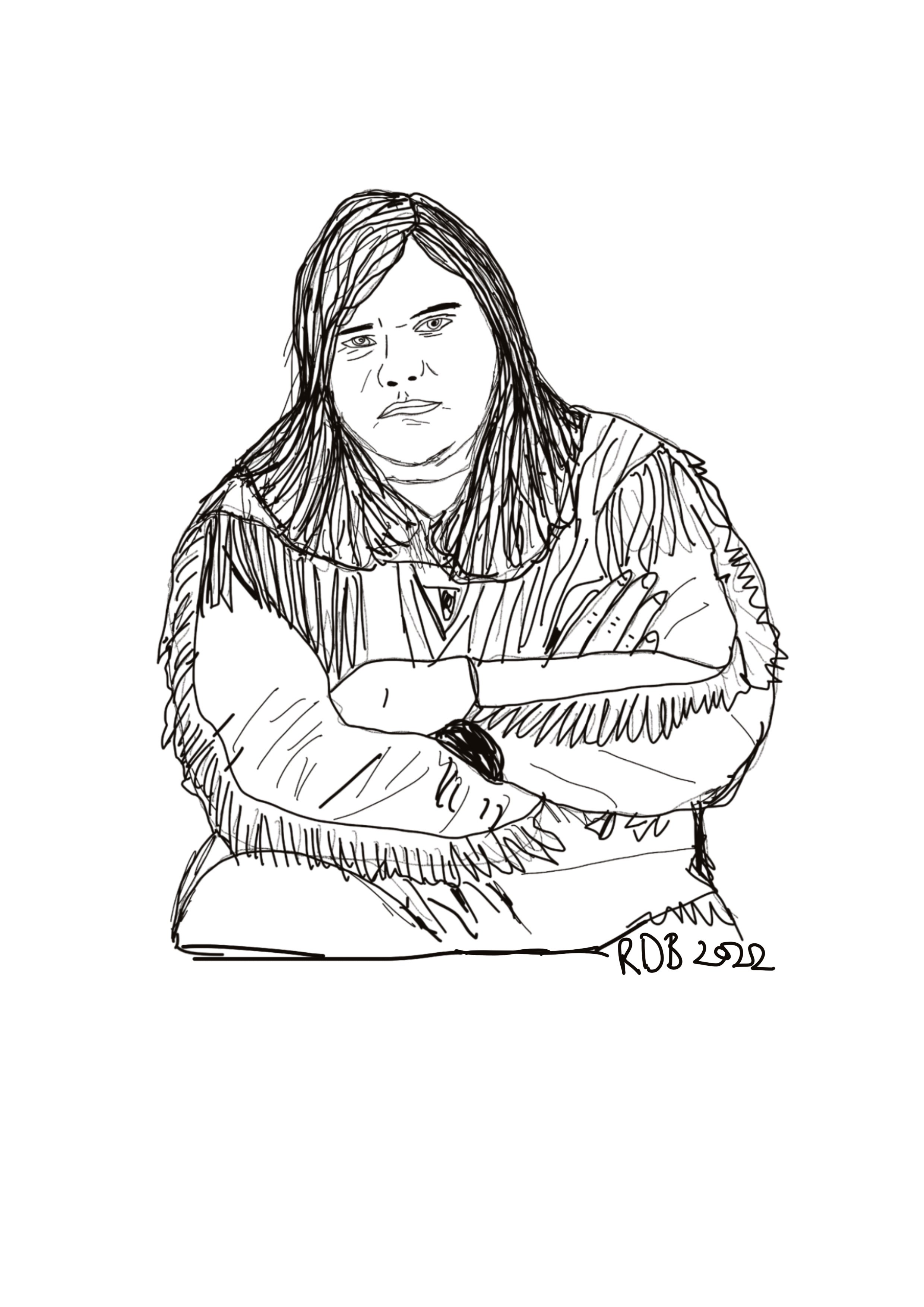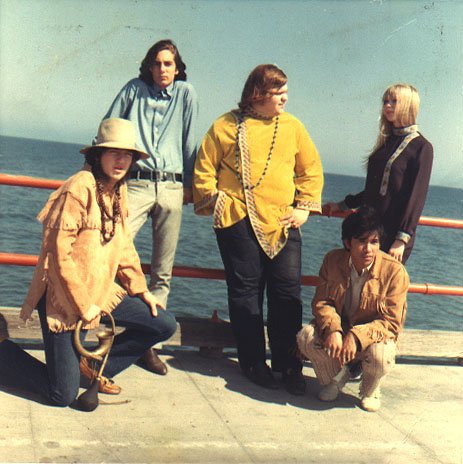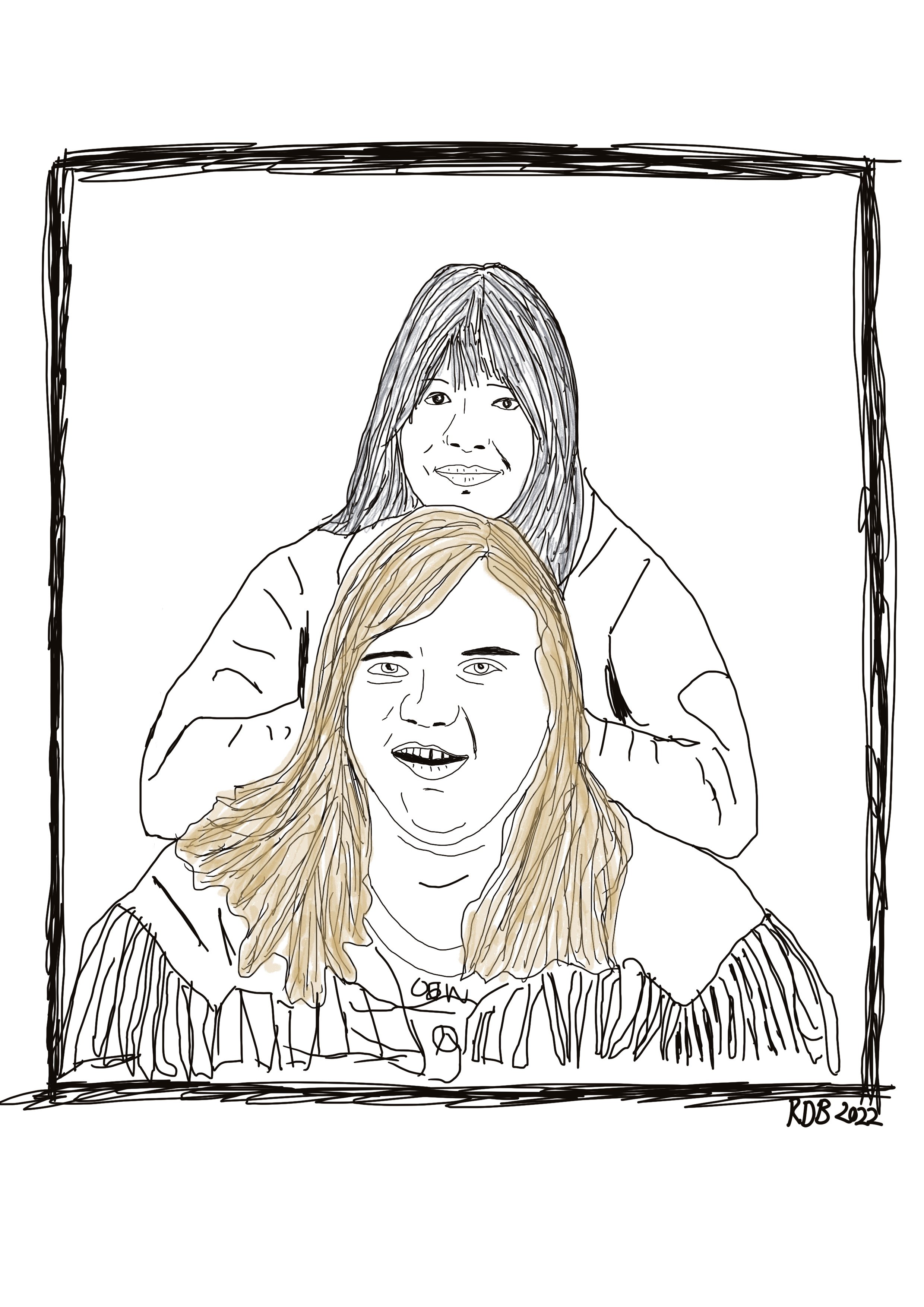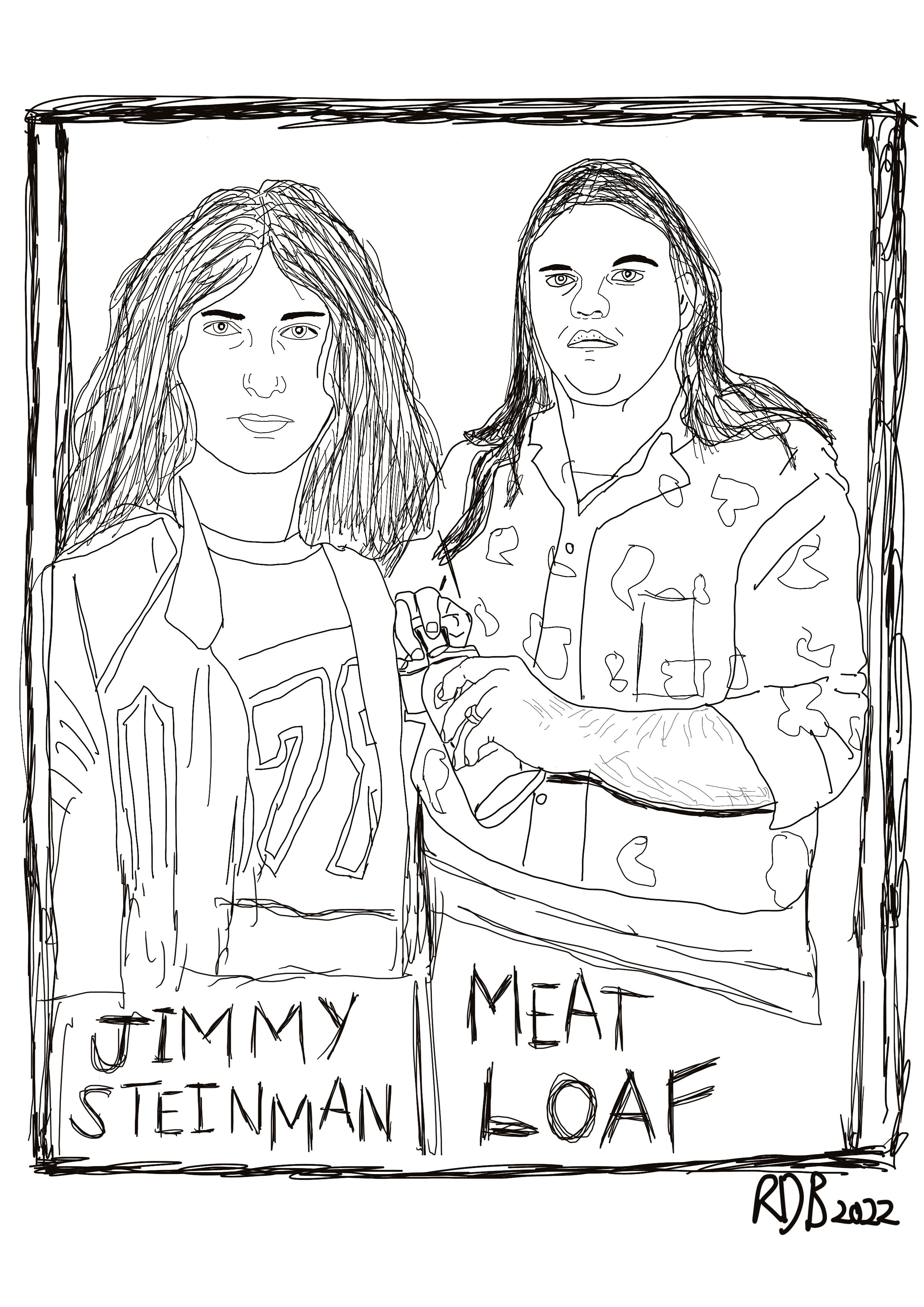The exceptional life of Michael Lee Aday (Part2)
Early life and childhood: Poor fat Marvin
Meat Loaf's early life was difficult and filled with deep trauma. Marvin Lee Aday was born in Dallas, Texas, on the 27th of September 1947. His mother, Wilma Artie, was an English teacher and sang in her own Gospel group. While his father, Orvis Wesley Aday, was a former police officer and war veteran. After being wounded, his father was medically discharged from the US army during World War II; it was after this he developed a problem with alcohol.
Marvin's father soon became a full-blown alcoholic, and often, he and his mother would have to go in search of his father, who would disappear for days at a time. Marvin would have to drag his father out of bars and pubs late at night and frequently fell victim to his violent outbursts.
It was Orvis that gave Meat Loaf the first piece of his nickname. Seeing his chubby newborn son, he remarked his bright red colour made him look like mincemeat. He cruelly insisted the nurses label his son's bassinet in the hospital nursery 'meat' and that Marvin be displayed front and centre so others could see his giant meaty offspring.
The Loaf part of his name came later when he was in school. Playing gridiron, he accidentally trod on his coach's foot with his football shoe spikes and was promptly called a Meat Loaf, a nickname which stuck with him his whole life.
To say Marvin Aday had a difficult childhood would be an understatement. His big meaty stature and general clumsiness led him to be teased mercilessly. He was a big baby and as he grew and developed, his weight became a problem. By 12, he was 5 foot 2 inches (158 cms) and weighed 240 pounds (108kg). As a result, he was bullied and ostracised at school. His classmates' parents even told him that he was too fat to play with their children.
As a result, he became timid and spent a lot of time alone. This one factor led him to become extremely shy and persistently suffer from social anxiety throughout his life. But later, he did say that this time alone allowed him to develop his creativity and imagination.
Another story Meat Loaf told about this period was about a radio advertisement for Levi jeans which used his name to say 'Poor fat Marvin couldn't wear Levi's.' This led to ever more teasing at school. He never forgot this and grew to hate his name. Later he legally changed his first name to Michael.
Meat Loaf was a boisterous child; he was always getting himself hurt and getting into trouble. He went through a stage at around five years of age where he persistently ran away from home.
As a child, he was extraordinarily accident-prone and began gathering concussions like boy scout badges. Later in several interviews, he even bragged he had a total of 18 concussions in all shapes and sizes, from being hit in the head by different objects, on the football field, car accidents, running into things and through other scrapes he got into.
One of Meat Loaf's most famous tales that he fed to journalists with embellishments for his amusement was when he got hit in the head with a shot put. He was knocked out and spent a week in the hospital. He was proud of how tough it made him sound. He said many people wouldn't live to tell the tale, and he credited the accident with making him realise he had a voice. After being hit in the head, he said he found out he could sing.
Besides getting into trouble and playing sports, Meat Loaf also discovered acting. Through high school, he got a part in every school play. He found he had a talent for making people laugh, and he come out of his shell. He loved to connect to the audience and his fellow performers. Later, Meat Loaf reflected how going on stage was a good way of concealing his shyness.
When he was fourteen, he got a part as an extra in the 1962 remake of Rodgers & Hammerstein musical State Fair. He watched the filming on a friend's farm and was roped into becoming a part of the action. He also got a walk-on role in a local production of Carmen, and witnessing the reality of professional acting life; he fell in love with the rebellious nature of a career on the stage and screen.
Soon he walked away from the football and baseball field and delved into performing getting involved in local bands.
His mother Wilma didn't want Meat to get into the music scene, but he did it anyway. The first song he ever sang was a cover of the Stones' Satisfaction, and he was promptly asked to tour with a local band.
Rebelling against his mother's wishes, he became the quintessential problematic teenager, staying out late and getting into trouble. Meat Loaf's mother promptly took away his car and grounded him. Losing his temper he slapped his mother; immediately remorseful and afraid of what his father would do if he found out, he promised to walk the line and never disrespect her again. Wilma made sure he kept this promise.
After high school Meat Loaf enrolled in Lubbock Christian University, where he threw himself back into sports like baseball.
Just when you think Meat Loaf's childhood and adolescence couldn't get any worse, his mother was diagnosed with breast cancer. She was sick for many years and eventually passed away when ML was 19.
Music journalist Mick Hall in his biography Like a bat out of hell: the larger than life story of Meat Loaf, describes the events after the death of Wilma. At the funeral, Meat was so insane with grief he tried to lift Wilma out of her coffin in the funeral parlour and yelled out for them not to take her away from him. He blocked out the funeral from his memory. He told Rolling Stone many years later that it all felt like he was in a movie.
The truth was that Meat Loaf had been in denial and had run from the confronting situation of his mother's terminal illness. After Wilma's death, Meat Loaf's relationship with his father went from bad to worse. Meat's father, Orvis, was even worse at coping with the emotions surrounding the death of his wife than his son. Orvis went on one of his drinking binges and took everything out on his son.
Wilma had left Meat Loaf a small inheritance, but Orvis was trying to take control over it. So Meat went before a judge where the money was given directly to him. Orvis became more unstable and hurled abuse at his son. One night, he grabbed a kitchen knife, and tried to stab Meat.
Luckily Meat Loaf dodged his father's drunken attempted murder and fought back. Later ML told how he had to fight for his life, breaking his father's nose and three of his ribs. He left his childhood home that night. Meat walked out of the house in nothing but his t-shirt and shorts, got into his '65 Chevy, and drove off.
He took his inheritance from Wilma and rented an apartment in Dallas where he closed the door on the outside world and didn't open it for three months. Wrapped inside his grief during those months, he slowly came out of it with a strange new resolve and purpose. He took his pain and loss and fed it into his psyche and desires. Whenever he had a song, he knew what he was singing about and who he was singing for. So he bought a ticket to LA to find out what he could do with his talent.
Early career: Finding his way
The early months in LA for Meat Loaf were still heavy with grief and sadness. He rented a small apartment on Ventura Boulevard and felt incredibly lonely and sad over his first Christmas and New Year alone. But it was music that helped him to find focus in his life.
For anyone wanting to get into music or acting 1960's Los Angeles was the place to be. The swinging 60s were filled with an energy of new sounds, bands and creative opportunities. He began to socialise at the Balboa Youth Centre in Encino, where he watched many contemporary bands who still hadn't made it to Texas. He saw Jimmy Hendrix, then the Yardbirds featuring a young Jimmy Page. He fell under the spell of Janis Joplin with her massive emotional voice, and performances were a tremendous inspiration to him.
While singing a cover of Janis's Piece of my heart, he caught the eye of LA garage band musician Gary Spagnolo who was a part of the local trendy psychedelic scene. Gary hooked up Meat with a band called The Prunes, and they recorded two songs that Meat had written by himself. He sang the songs as hard as he could, and even though he wasn't a songwriter, he made them work, and people began to notice his powerful and expressive voice.
In 1968, Meat Loaf formed his first band named Meat Loaf Soul. The band started off doing small gigs around the place and opened for Iron Butterfly, Jefferson Airplane, the Grateful Dead, the Who and Buffalo Springfield.
Soon, Meat was courted by record business executives looking for new talent to exploit. He hid his insecurities behind a new rock star persona he invented for himself, strutting around the stage with confidence, showing off his big voice and bigger than life sweaty extravagant showmanship.
Not wanting to be taken for a ride by smooching record execs, Meat Loaf Soul began touring along the west coast, opening shows for well-established acts like Van Morrison, Janice Joplin's band Big Brother and the Holding Company.
Meat was sleeping in the back of his car up in the Highland Hills, but he would get a hotel room when he made some money. He said he made ends meet doing little odds and ends, including dodgy things like selling hallucinogens. After all, it was 1968, the summer of love filled with a new rebellious generation of recreational drug-taking, weed-smoking and alcohol consuming hippies.
Meat Loaf continued to concentrate on his band, who were performing wherever they could. They would load up their gear into a truck and drive 36 hours to Michigan to play with bands like the Iggy Pop fronted Stooges. His band's lineup changed regularly, as did their name; they even tried calling themselves Popcorn Blizzard. But they kept going on the road for the next couple of years. They opened for Ted Nugent and played with MC5.
As Meat Loaf was making his name on the music scene, he was also being offered roles in musical theatre. In between gigs and jobs, a friend of his had lined up some work parking cars outside the Aquarius Theater, where a production of the new musical Hair was playing.
Meat's friend introduced him to Greg Carlos in the car park, who was playing the lead in Hair. Striking up a conversation, he told Greg he was trying to put a band together and that he sang and was invited to audition as the production was going on tour.
Seeing a queue of hundreds of hopefuls, he refused to wait for hours for an audition. So Greg took him to the front of the line and introduced him to the director Armand Coullet.
Meat told the story of how, when meeting Coullet, he was asked what he wanted to do. Meat shrugged and said he was trying out for a job in the parking lot. He made everyone laugh, and now they were curious to hear him sing. He sang a blues number which sounded like something epic coming from his gospel voice. That night he wasn't parking cars outside rather inside, watching and preparing to perform his part in the show.
Meat Loaf and Hair were a perfect fit; they were rebellious, trailblazers who didn't look or sound like anything else. Hair: the American tribal love-rock musical was about a Vietnam war draftee who befriends a tribe of hippies on his way to sign up for the army. The hippies introduce him to marijuana, LSD and their network of unorthodox relationships and anti-war draft evasion. Meat's soulful voice shined out from the chaos of the then-experimental new age music. Both Meat and Hair were a massive hit.
By the time the tour got to Detroit, Meat's performance review was on the front page of the local Detroit Free Press paper, and it got the attention of record companies. The legendary Motown records approached him. Meat met with Harry Balk, who offered him a record deal but with a condition. Meat wanted to form a duo with a girl named Stoney, a fellow cast member from Hair who he thought was one of the best singers he'd ever heard. Meat got approval from Harry and was elated at the prospect of recording his first album.
Motown initially saw Stoney & Meatloaf as the perfect addition to their new rock imprint, Rare Earth which was supposed to branch out and showcase new non-Afro American talent in the Motown signature style and genre.
But Motown wasn't like other record companies. Singers were just singers, and if they didn't sell records, they were unceremoniously dumped.
While Stoney & Meat Loaf's album launched with a bit of a buzz and excitement, listeners were enthusiastic at first. But the public was confused when they discovered the duo was white and felt as if they had been misled. So through no fault of his Meat Loaf found himself back to square one.
But just when Meat was wondering what to do next, he got a call from Hair director Armand Coullet to say the production was going to Broadway and if Meat wanted to come.
Unfortunately, Hair in New York was a disaster. The producers had fired half of the cast, so everyone who turned up to replace them found themselves in very turbulent waters. After a few days of negativity and stress, Meat Loaf left town and joined another production in Pittsburgh and another in Buffalo.
Just as he wondered if he was destined to move from town to town singing Aquarius forever, he did a few other shows, including an off-Broadway gospel musical titled Rainbow in New York produced by the legendary NY impresario Joseph Papp.
Under Papp's wing, Meat Loaf worked for the New York Public Theatre as a part of the Shakespeare in the Park Festival. He starred in As You Like It alongside Raul Julia, Meryl Streep and Mary Beth Hurt.
Meat knew he wasn't a traditional thespian, and after the production, he headed to Kansas City and back to singing.
Years later, he told the story that he had to sing during his Shakespeare in the Park role, and his voice drew the attention of some opera patrons. They approached him and offered him $60,000 a year to train for five years as an opera singer and then debut at the Metropolitan Opera house. But he refused after he realised the controlling nature of opera conductors. He was too rebellious to be limited by others. So he refused. But if he had taken advantage of this classical training, he may have been able to take better care of his voice.
In the post-Shakespeare in the Park period, he auditioned for a part in the new musical Grease. He got the region and was literally on the way to sign his work contract when he met Jim Rado, the creator of Hair who had a new play and wanted Meat to star in it. Rado sent Meat to talk to his agent Jeff Hunter. And before Jim could do anything, Jeff told him about a different project.
More Than You Deserve was an experimental theatre piece produced by Joe Papp, which was even more crazy and out there than Hair had been. The auditions were happening on the same day in the East Village auditorium. So Meat walked down to the audition, which turned out to be probably the best decision he would make in his life.
When Meat got to the building, the only person there was a strange-looking guy named Jim Steinman. The wealthy young intellectual rebel who had convinced perplexed academics from the prestigious Amherst College into allowing him to produce experimental theatre while also nearly flunking out of the school. And who now had caught the eye of Joe Papp, who was producing More Than You Deserve.
Meat sang a song from the album he recorded with Stoney titled: I'd love to be as heavy as Jesus. Jim Steinman quipped that Meat might be as heavy as two Jesuses when he finished. Apart from Steinman's sarcasm, this first meeting was the beginning of one of the most successful collaborations in contemporary rock music history.
As soon as Steinman heard Meat Loaf sing, he fell in love with his voice and immediately thought Meat should be singing Wagnerian rock opera. Jim said that Meat Loaf had his dream voice. So it was like an epiphany. Mear was perfect. The only problem was he didn't have any idea what.
Steinman didn't know what to do. So he had them write a part for him in More Than You Deserve. After singing the main show-stopping song in the performances, the audience would burst into thunderous applause. So then Jim discovered that Meat was a great singer and an outstanding actor. From that moment, Jim knew Meat would be perfect for performing his songs because Meat would be able to act out what Steinman had in his imagination.
Later in an interview, Steinman described Meat Loaf's singing as witnessing paranormal activity. His voice was booming; he made the room shake, his eyes would roll into his head so you'd only see the whites, and his hands would contort. It was a spectacle to be beheld. In the performances with his touring band, the Neverland express Steinman said Meat would get so worked up that his body would sweat so much that there would be steam emanating from him, like an athlete working out in a gym.
So after Joseph Papp was called in to hear Meat, he was offered a part in More Than You Deserve. The bizarre plot was about a US army major stationed in Vietnam who falls in love with a nymphomanic news reporter after other soldiers gang-raped her. Meat was offered the part of the maniac soldier named Rabbit, a good-hearted junkie conscript with an obsession with blowing up people with grenades.
In the middle of the show, Rabbit gets a letter from his mother telling him his wife has left him, and that's when Meat sings the song More Than You Deserve. The title song was a showstopper, and from the first time, Meat sang, it immediately got a standing ovation.
For Steinman, this was the first sign of what would happen next. Meat Loaf was the catalyst and cornerstone for Steinman's most successful compositions. Meat Loaf would become the embodiment of Steinman's entire creative universe.
More than you deserve was a song about an outsider, an outcast in love who not only loses but is also humiliated. It's a song for anyone who has ever been bullied, left out, betrayed or unaccepted in life.
Meat Loaf took the pathetic figure of Rabbit and gave him a deep sense of pathos. He wasn't simply a man whose wife cheated on him several times, and with several people instead, he became a natural person who a cruel destiny had thwarted.
There was something of pure innocence, and deep hurt in the way ML sang More than you deserve. In the hands of any other performer, it could have become something of a cruel farce, but Meat Loaf gave it a real sense of emotion which turned it into something different. It was still very theatrical, yet it had a genuine emotional heart that connected to the audience.
Steinman would spend the next forty years exploring the theme of the heartbroken outsider in his songs, from the yearning of those who didn't have and never will, the hurt of betrayal, and the romantic melodrama of desire and obsession, otherworldliness, fantasy and broken unrequited love.
More Than You Deserve is the song that inspires the songs from one of the most popular albums of all time Bat Out of Hell. It led to the creation of Two Out of Three ain't bad, For crying out loud, I'm going to love her for the both of us and later I'd do anything for love (but I won't do that). An intense broken, hearted epic genre that Meat Loaf brought to life with his superb acting and pureness of voice.






